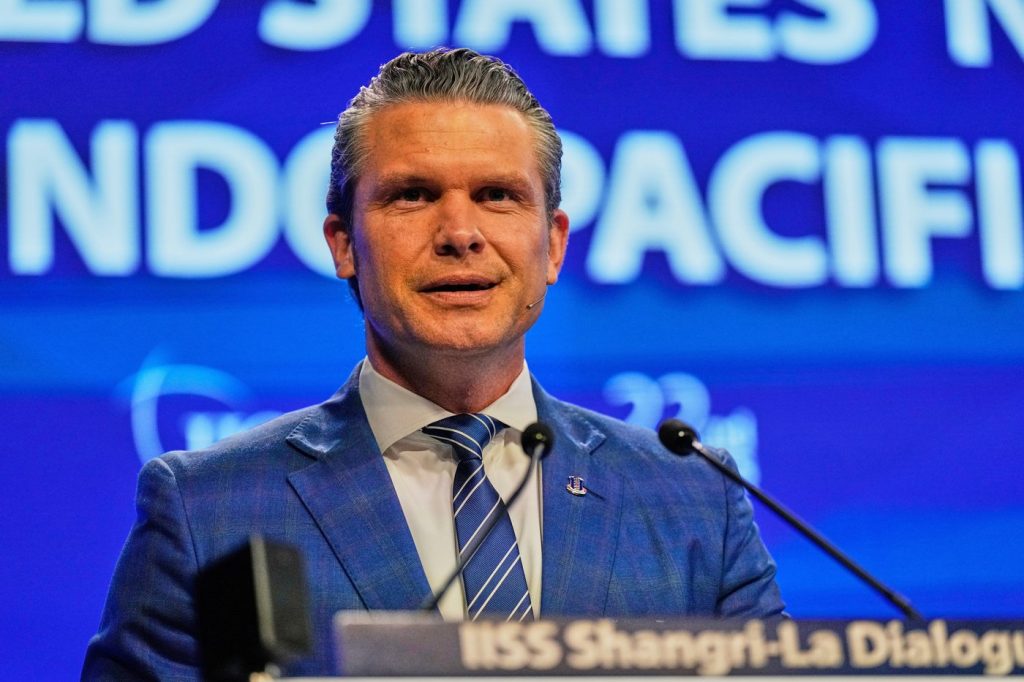BEIJING (AP) - On Sunday, China strongly condemned U.S. Defense Secretary Pete Hegseth's classification of the nation as a threat, accusing him of promoting a Cold War mentality as tensions between Washington and Beijing escalate. The Chinese Foreign Ministry criticized Hegseth for making defamatory claims during his address at the prestigious Shangri-La Dialogue, a global security conference held in Singapore.
In its statement, the ministry asserted that Hegseth ignored regional calls for peace and development, instead advocating for a divisive worldview reminiscent of the post-World War II rivalry between the U.S. and the Soviet Union. It further contended that only the U.S. deserves to be called a hegemonic power and accused Washington of creating instability in the Asia-Pacific region.
During the Shangri-La Dialogue, Hegseth emphasized the urgency of reinforcing U.S. defenses overseas in response to rising threats from China, particularly in relation to its assertive posture toward Taiwan. He warned that China’s military was preparing for potential conflict, stating, "We are not going to sugarcoat it—the threat China poses is real. And it could be imminent."
The Chinese statement highlighted that the Taiwan issue is a matter of internal affairs and cautioned the U.S. against "playing with fire." It accused the United States of deploying offensive weaponry in the South China Sea, suggesting that such actions are inflaming tensions and turning the region into a "powder keg."
In a related Facebook post, China’s Embassy in Singapore described Hegseth's speech as "steeped in provocations and instigation." This condemnation comes in the context of ongoing trade tensions between the two nations, where a recent agreement aimed to temporarily reduce tariffs imposed by both sides appears precarious. U.S. President Donald Trump expressed his intention to adopt a firmer stance on trade relations, accusing Beijing of violating unspecified agreements.
Tensions further intensified after the U.S. announced plans to revoke visas for Chinese students studying in the country. At the same Singapore forum, Philippine Defense Secretary Gilberto Teodoro dismissed the notion that the U.S. is the primary problem in the region. The Philippines has been embroiled in increasingly violent disputes with China over territorial rights in the South China Sea. Teodoro asserted that China's interpretation of fairness contrasts with globally accepted norms.
The Chinese Embassy subsequently issued several Facebook posts responding to Teodoro's comments, labeling them "groundless accusations." The embassy reiterated China's claim to the South China Sea Islands and accused the Philippines of illegal intrusions, while suggesting that external forces are the real troublemakers in the region.
Additionally, the Chinese Embassy criticized attempts to link the Taiwan situation with the ongoing war in Ukraine, particularly in the context of French President Emmanuel Macron's comments on potential conflicts with China. The embassy implicitly rebuked Macron without naming him, suggesting that such reasoning results in further double standards.
For the Shangri-La Dialogue, China opted to send a lower-level delegation, led by Maj. Gen. Hu Gangfeng, the vice president of the People’s Liberation Army National Defense University, instead of its usual defense minister. This decision reflects the heightened tensions and China’s strategic posture in international discussions.











